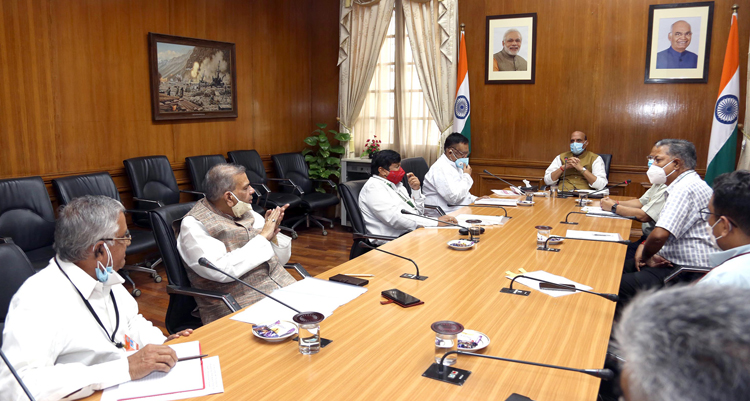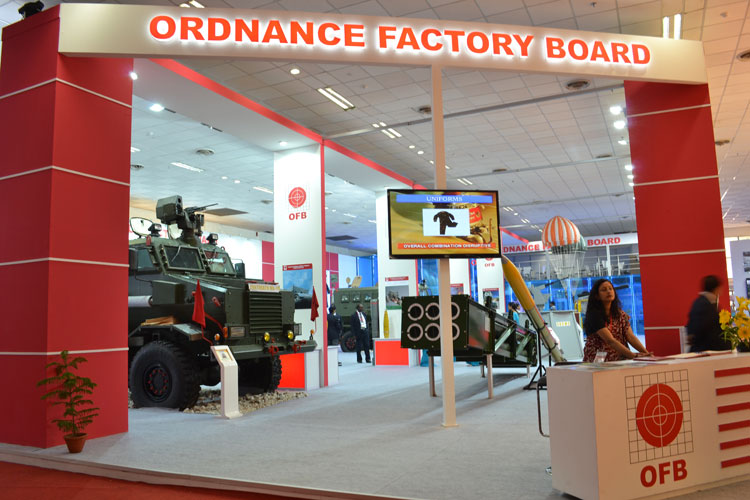INDIAN ARMED FORCES CHIEFS ON OUR RELENTLESS AND FOCUSED PUBLISHING EFFORTS

The insightful articles, inspiring narrations and analytical perspectives presented by the Editorial Team, establish an alluring connect with the reader. My compliments and best wishes to SP Guide Publications.

"Over the past 60 years, the growth of SP Guide Publications has mirrored the rising stature of Indian Navy. Its well-researched and informative magazines on Defence and Aerospace sector have served to shape an educated opinion of our military personnel, policy makers and the public alike. I wish SP's Publication team continued success, fair winds and following seas in all future endeavour!"

Since, its inception in 1964, SP Guide Publications has consistently demonstrated commitment to high-quality journalism in the aerospace and defence sectors, earning a well-deserved reputation as Asia's largest media house in this domain. I wish SP Guide Publications continued success in its pursuit of excellence.
- Operation Sindoor: Resolute yet Restrained
- India’s Operation Sindoor Sends a Clear Message to Terror and the World – ‘ZERO TOLERANCE’
- Japan and India set forth a defence cooperation consultancy framework, talks on tank and jet engines
- Terrorist Attack in Pahalgam in Kashmir: Unfolding a long surgical war against PAK
- Lt General Pratik Sharma takes over Command of Indian Army's Northern Command
Clipping Wings of OFB Worker Unions
The Essential Defence Services Bill-2021 effectively rules out future strikes by workers' federation of OFB unless they want to defy the bill by going on strike and challenge the government to collectively dismiss them
 |
The Author is Former Director General of Information Systems and A Special Forces Veteran, Indian Army |

On June 15, 2021, the Union Government approved the Ordnance Factory Board (OFB) with 41 Ordnance Factories (OF) to be restructured into seven Defence Public Sector Undertakings (DPSUs): Ammunition & Explosives; Vehicles; Weapons & Equipment; Troop Comfort Items; Ancillary; Opto-Electronics, and; Parachute Group.
Concurrently, the Department of Defence Production (DoPD) under Ministry of Defence (MoD) communicated following: for the ‘interim’, first set of Board of Directors of the Corporate entities is to be appointed from senior serving officials of OFB/DoPD, Armed Forces, CGDA and nine existing DPSUs; for CMD: SAG and above level officers of Indian Ordnance Factory Services (IOFS), OFB, with minimum five years service in the SAG; for Functional Directors: SAG officers of IOFS, OFB, with minimum two years service in the Grade, and; age – not more than 57 years on October 1, 2021.
Previous attempts to corporatise OFB were stonewalled due to strikes by workers unions
On June 16, 2021, the unions of the 70,000 workers of the OFs opposed the government decision despite the government assurancethat all OFB employees (Group A, B and C) from different production units will be transferred to the corporate entities on ‘deemed deputation’ for initial two years without changing their service conditions as government employees. This implies bonanza of deputation allowance even to officials of IOFS and OFB who are in Group ‘A’ Services. Armed Forces are not in Group ‘A’ Services.
Previous attempts to corporatise OFB were stonewalled due to strikes by workers unions: Indian National Defence Workers' Federation (INDWF) affiliated to Congress, All India Defence Employees' Federation (AIDEF) affiliated to the Left and Bhartiya Pratiraksha Mazdoor Sangh (BPMS) affiliated to RSS/BJP, all under the umbrella of Confederation of Defence Registered Associations.
Government says restructuring of OFB will improve accountability, efficiency and competitiveness of the OFs
These federations also went on strike last year concurrent to the Chinese aggression in Eastern Ladakh. This was construed and engineered by Left parties but as may be seen the federations are affiliated to multiple political parties. Their fear has been loss of jobs, protection of salaries, pensions and change in work culture from the current laid back to hard work under a more efficient system.
On July 16, Defence Minister Rajnath Singh held talks with worker federations of the OFB. The federations put forward various points, mainly seeking a last chance to improve OFB performance while continuing in the present set-up for some more years. The Defence Minister assured them that interests of employees would be protected while implementing corporatisation, advised them to continue discussions with the DoPD and that their issues would be considered sympathetically by the Empowered Group of Ministers under his Chairmanship. Raj Kumar, Secretary DoPD clarified that the new corporate entities would be 100 per cent Government owned.
On August 3, the Lok Sabha passed the ‘Essential Defence Services Bill-2021’. The proposed legislation empowers the government to declare services mentioned in it as essential defence services: “the cessation of work of which would prejudicially affect the production of defence equipment or goods; or the operation or maintenance of any industrial establishment or unit engaged in production of goods or equipment required for any purpose connected with defence; or repair or maintenance of products connected with defence." It also prohibits strike and lockouts in any industrial establishment or unit engaged in essential defence services.

The Bill defines ‘strike’ as “the cessation of work, go-slow, sit down, stay-in, token strike, sympathetic strike or mass casual leave, by a body of persons engaged in the essential defence services, acting in combination or a concerted refusal or a refusal under a common understanding of any number of persons who are or have been so engaged to continue to work or to accept employment." It includes the “refusal to work overtime, where such work is necessary for the maintenance of the essential defence services; (and) any other conduct which is likely to result in, or results in, cessation or retardation or disruption of work in the essential defence services".
The Essential Defence Services Bill-2021 effectively rules out future strikes by workers federation of OFB unless they want to defy the bill by going on strike and challenge the government to collectively dismiss them. But even in such case the government has the option to declare the federations unlawful and charge the federation leaders with criminal conspiracy against the Union Government.
The above facilitates transition of the OFB and 41 OFs into seven DPSUs. But the million dollar question is with mere cosmetic changes and retaining the same work force under the DoPD, how will government tackle the bane of the OF which includes: inefficiency; lack of accountability; poor work culture; substandard products costlier than available off-the-shelf; wasteful expenditure, and; corrupt practices – all of which has also been pointed out by the Comptroller and Auditor General (CAG) periodically.
With the same workers and management, corruption can hardly be stymied. Army had reported in 2020 that faulty OFB ammunition had resulted in 403 accidents in past six years
Government says restructuring of OFB will improve accountability, efficiency and competitiveness of the OF. But work culture can hardly change with 100 per cent same employees retained and overall control and management continuing with the DoPD-OFB-IOFS. Ironically, with assured employment, job security and now also ‘deputation allowance’ to expect better work culture and efficiency is naïve. Moreover, Armed Forces (primary users) are only included in Board of Directors whereas they should have been at every level.
With the same workers and management, corruption can hardly be stymied. Army had reported in 2020 that faulty OFB ammunition had resulted in 403 accidents in past six years causing deaths of 27 soldiers and loss of 960 crores. Army’s internal assessment sent to MoD last year stated that 100 medium artillery guns could have been bought in place of the faulty OFB ammunition lying around. In addition, quantity 1,00,00,000 rounds of Tavor ammunition supplied by the OFB to the Army were found all faulty.
The CBI has recently discovered that Gun Carriage Factory (GCF) Jabalpur handed over six Dhanush guns to the Army in 2019 with defective wire race roller bearings despite the GCF tests showing that these bearings were unacceptable due to deviations in dimensions. This has been covered in more details in these columns elsewhere. In the zeal to score achievements under ‘Make in India’ the fact that these guns could result in serious accidents causing death and injury to soldiers and could malfunction at critical junctures was simply ignored. These are just few examples. The answer lies in eventual privatisation of the restructured OFB and OFs, not cosmetic corporatisation as is planned.





